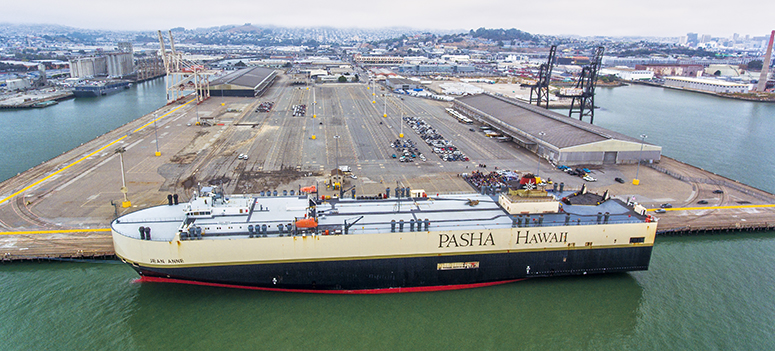Much to the relief of Bay Area importers and exporters, dockside labor has agreed to early contract negotiations with management before another labor crisis unfolds.

The Port of San Francisco welcomed the first shipment of 500 automobiles and 30 boats to the new Pasha Marine Terminal at Pier 80 in August. Photo by David Perry & Associates
By Patrick Burnson
Published: September, 2016
Much to the relief of Bay Area importers and exporters, dockside labor has agreed to early contract negotiations with management before another labor crisis unfolds.
In a letter to Robert McEllrath, president of the International Longshore and Warehouse Union, and to James McKenna, chairman and CEO of the Pacific Maritime Association, the nation’s leading trade organizations pleaded for cooperation:
“You have both recognized the negative economic impact of disruptions and slowdowns that occurred during the last negotiations. We believe starting negotiations early will help avoid a repeat of that experience.
“As we have previously stated, we believe a new model for future negotiations needs to be developed, one which stresses early and continuous dialogue. This should include a pledge by both parties to ensure there are no disruptions to cargo movement during negotiations. Maintaining the arbitration mechanisms in the existing contract for the duration of the negotiations, even if the contract expires before a final agreement is reached, is critical to that process.
“We fully believe that agreeing early to a contract extension or a new long-term contract will provide the stability and predictability that is needed for global competitiveness that will benefit all stakeholders (labor, terminal operators, cargo owners, etc.) who rely on West Coast ports.”
Port of San Francisco Welcomes First Automobile Shipment
The Port of San Francisco held an opening ceremony to welcome the M/V Jean Anne to Pier 80 late last month, as the first shipment of 500 automobiles and 30 boats was unloaded onto the Pasha Marine Terminal at Pier 80.
The port’s new 15-year lease agreement with Pasha Automotive Services allows the import and export of vehicles by ship at Pier 80, with on-terminal automobile preparation and detailing services. The agreement promises to transform Pier 80 from an underutilized asset to a thriving marine terminal creating new revenue for the port and significant economic and employment benefits for San Francisco.
The port and Pasha have collaborated with Mayor Edwin Lee’s Office of Economic and Workforce Development to ensure that auto processing job opportunities are focused on San Francisco residents in District 10.
Port of Oakland Enjoys Blockbuster Month of Cargo
The Port of Oakland, meanwhile, handled the equivalent of 223,619 20-foot cargo containers in July. That was the most since it lifted 227,996 20-foot containers in August 2006. Figures for box throughput was not yet available for last month, but a new trend for more volume seems to be in place.
The port said cargo volume was up across the board, perhaps signaling hope for the upcoming peak shipping season. “The numbers are encouraging and with holiday shipments set to commence, this could be the start of something good,” said Maritime Director John Driscoll.
Among the positive signs last month in Oakland:
• Total container volume jumped 8.8 percent from July 2015;
• Export volume was up 3.6 percent, a metric that increased for the sixth time in seven months, strengthening Oakland’s status as a leading gateway to Asia; and
• Empty container volume rose as shipping lines repositioned boxes to prepare for an anticipated uptick in peak-season cargo.
The port said it received 153 visits from container ships in July. That was up from 136 vessel calls during the same month a year ago. The port said the numbers may quiet speculation that a newly widened Panama Canal threatens West Coast port volume. Larger canal locks opened July 1, coinciding with Oakland’s cargo surge.
The port’s total cargo volume is up 6.4 percent through the first seven months of 2016. Exports are up 9.1 percent in that span and imports have risen 8.6 percent.
Uber Acquires Self-Driving Truck Startup
San Francisco-based Uber may soon surface as a player in the port drayage space. The company recently announced that it had acquired Otto, a startup that’s been working on developing self-driving trucks for an undisclosed sum.
Anthony Levandowski, a former Google executive who has been championing autonomous driving for years, is the company’s co-founder. He’ll head up Uber’s entire self-driving division, meaning both Otto’s self-driving truck efforts and Uber’s own fast-growing autonomous division, reporting directly to Uber CEO Travis Kalanick.
Otto was founded earlier this year by former employees from Google, Apple, Tesla, Cruise Automation and others. Otto’s goal was to turn commercial trucks into self-driving freight haulers. Instead of building its own self-driving trucks, the company was looking to build hardware kits for existing truck models.
Patrick Burnson is the Executive Editor of Logistics Management. (www.logisticsmgmt.com)

